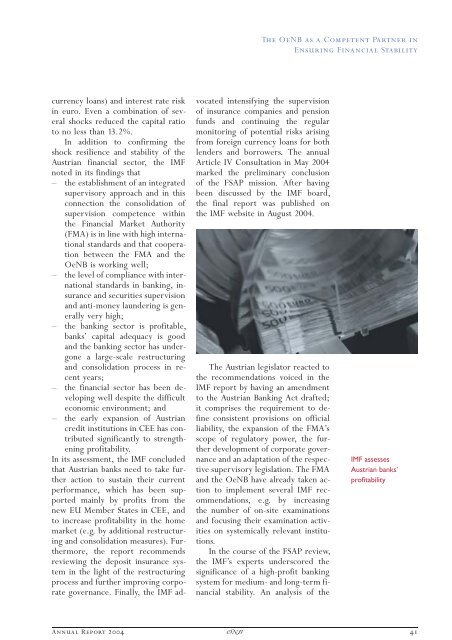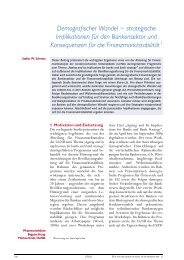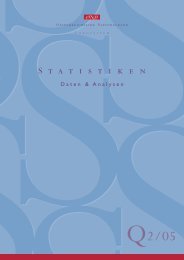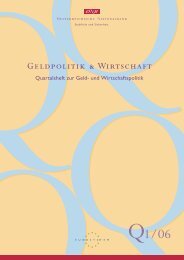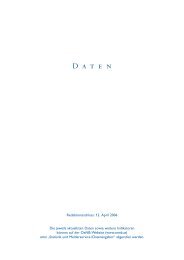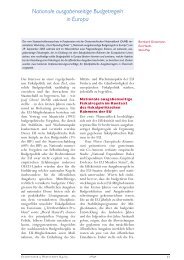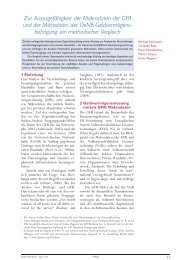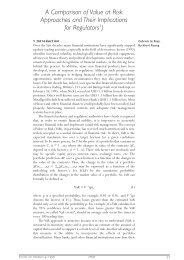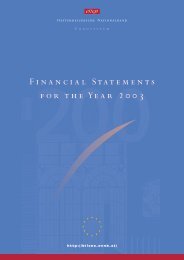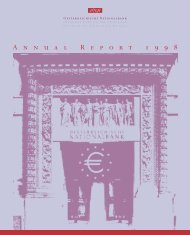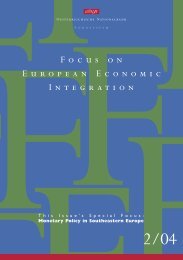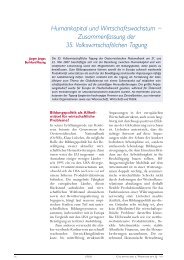You also want an ePaper? Increase the reach of your titles
YUMPU automatically turns print PDFs into web optimized ePapers that Google loves.
currency loans) and interest rate risk<br />
in euro. Even a combination of several<br />
shocks reduced the capital ratio<br />
to no less than 13.2%.<br />
In addition to confirming the<br />
shock resilience and stability of the<br />
Austrian financial sector, the IMF<br />
noted in its findings that<br />
— the establishment of an integrated<br />
supervisory approach and in this<br />
connection the consolidation of<br />
supervision competence within<br />
the Financial Market Authority<br />
(FMA)isinlinewithhighinternational<br />
standards and that cooperation<br />
between the FMA and the<br />
OeNB is working well;<br />
— the level of compliance with international<br />
standards in banking, insurance<br />
and securities supervision<br />
and anti-money laundering is generally<br />
very high;<br />
— the banking sector is profitable,<br />
banksÕ capital adequacy is good<br />
and the banking sector has undergone<br />
a large-scale restructuring<br />
andconsolidationprocessinrecent<br />
years;<br />
— the financial sector has been developing<br />
well despite the difficult<br />
economic environment; and<br />
— the early expansion of Austrian<br />
credit institutions in CEE has contributed<br />
significantly to strengthening<br />
profitability.<br />
In its assessment, the IMF concluded<br />
that Austrian banks need to take further<br />
action to sustain their current<br />
performance, which has been supported<br />
mainly by profits from the<br />
newEUMemberStatesinCEE,and<br />
to increase profitability in the home<br />
market (e.g. by additional restructuring<br />
and consolidation measures). Furthermore,<br />
the report recommends<br />
reviewing the deposit insurance system<br />
in the light of the restructuring<br />
process and further improving corporate<br />
governance. Finally, the IMF ad-<br />
The OeNB as a Competent Partner in<br />
Ensuring Financial Stability<br />
vocated intensifying the supervision<br />
of insurance companies and pension<br />
funds and continuing the regular<br />
monitoring of potential risks arising<br />
from foreign currency loans for both<br />
lenders and borrowers. The annual<br />
Article IV Consultation in May <strong>2004</strong><br />
marked the preliminary conclusion<br />
of the FSAP mission. After having<br />
been discussed by the IMF board,<br />
the final report was published on<br />
the IMF website in August <strong>2004</strong>.<br />
The Austrian legislator reacted to<br />
the recommendations voiced in the<br />
IMF report by having an amendment<br />
to the Austrian Banking Act drafted;<br />
it comprises the requirement to define<br />
consistent provisions on official<br />
liability, the expansion of the FMAÕs<br />
scope of regulatory power, the further<br />
development of corporate governance<br />
and an adaptation of the respective<br />
supervisory legislation. The FMA<br />
and the OeNB have already taken action<br />
to implement several IMF recommendations,<br />
e.g. by increasing<br />
the number of on-site examinations<br />
and focusing their examination activities<br />
on systemically relevant institutions.<br />
In the course of the FSAP review,<br />
the IMFÕs experts underscored the<br />
significance of a high-profit banking<br />
system for medium- and long-term financial<br />
stability. An analysis of the<br />
IMF assesses<br />
Austrian banksÕ<br />
profitability<br />
<strong>Annual</strong> <strong>Report</strong> <strong>2004</strong> ×<br />
41


